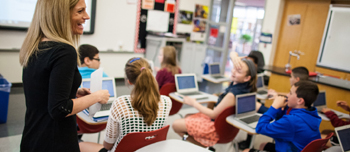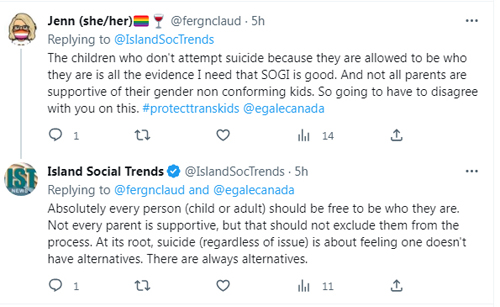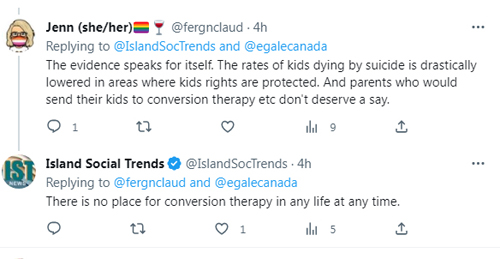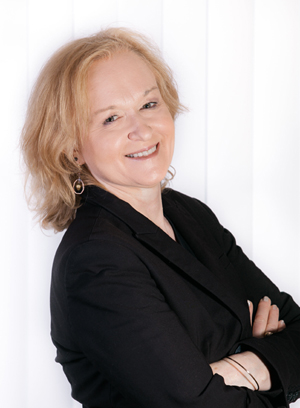Saturday June 24, 2023 | VICTORIA, BC [Updated 3:15 pm]
Editorial analysis by Mary P Brooke | Island Social Trends
Parents included in the process of their child’s identity at school?
Presently in New Brunswick, parental consent is required for a child in school to change their gender identity.
This has been a high-profile political debate in that Atlantic province, possibly even driving the province under Premier Blaine Higgs to an election. Higgs has defended the right of parents to be included in decisions about their children’s education within the school system.
See the full transcript of a June 18, 2023 CBC interview with NB Premier Higgs, as published in Island Social Trends.
BC Government statement:
In light of the national interest in this issue of parental rights in the SOGI process within schools, we asked the BC Ministry of Education and Child Care for their statement on how sexual orientation and gender identity (SOGI) is handled in public schools in British Columbia. This is their statement to Island Social Trends (June 23, 2023):
- The Province is committed to creating safe, welcoming and inclusive school environments for all students.
- In July 2016, the B.C. Human Rights Code was updated to include gender identity and expression among the protected grounds of discrimination; sexual orientation was already included at the time.
- In response to the Human Rights Code amendment, the Ministry of Education and Child Care directed all of B.C.’s 60 school districts to have school inclusive codes of conduct that safeguard students from discrimination and bullying for their sexual orientation or gender identity (SOGI).
- Ministry policy does not determine if/when parental consent is needed for student choice to change name, gender, or pronoun.
- Schools and districts determine how to best support each individual student in these situations, while remaining in compliance with the B.C. Human Rights Code.
In a nutshell, there is no requirement to let parents know how their child is identifying themselves at school. It’s left up to each circumstance and the skillset of school counsellors and administration in each instance.
In the case of New Brunswick schools, teachers were directed by school regulations to deliberately conceal a child’s in-school gender issues from parents. Removing that embedded requirement for deceit is what finally ignited this to national attention.
It should be noted that at the core of the NB Premier’s concern on this issue is coming from a place of being a father and grandfather. This is a gut-level issue, aiming to include the rights of parents and families up against a government-led school system that might be encroaching just too far into the well-being of family life.
Exploring recent societal emergence of gender issues:
There are many components to the process of safeguarding students from discrimination and bullying for their sexual orientation or gender identity. Whether this should fall entirely on the school system is — for some if not many families in the community — a matter for debate.
As with all sociological issues, examining the root cause(s) is important for hoping to achieve a fuller understanding which hopefully leads to actions that are sensible and reasonable for the long term. Both the well-being of individuals and the overall well-being of society are domains to respect.
This issue — and indeed the physical and psychological changes (sometimes permanent) of a gender or sexual change — is not old enough in years for any long-term impacts to really be seen. The lives of children, parents and families are being changed forever, and perhaps not always in ways that will be healthy in the long term.
SOGI is a big landscape — especially as it is dealt with in schools. But everyone across society might do well to consider the range of reasons why SOGI has risen to be such a matter of concern.
Prominence of this issue is relatively new:
Over the course of time there has always been sexual and gender variation. In many cases people, families and communities have adapted. Though not always, and so the bullying and discrimination aspect is well heeded.
But the prominence of this issue in recent years is a new phenomenon. What are the pressures from the social framework that somehow urgently compel people — particularly young children and teens — to question the matters of their body and soul, and then to act on that by physical adaptation and course-changes in how they interact with society?
Having this discussion is not transphobic or homophobic. It’s about exploring humanness beyond the confines of gender or sexuality, more about the whole person. It’s actually a form of liberation to get beyond identity being tied to anything but soul (the real you inside all of the trappings of body and society).
Consequences:
If and when they make a change, are they any happier? Or do they find themselves working hard to fit into a new paradigm where the reality of life is that this is always variation and a range of levels of acceptance.
How can a child or teen really know how they will feel about having biological children later on, after that intentionally no longer becomes possible? Scientific research has shown that the human brain is not fully functional with understanding consequence until age 25. [Some references on this matter: American Academy of Child & Adolescent Psychiatry – Teen Brain: Behavior, Problem Solving, and Decision Making | Stanford Medicine Children’s Health: Understanding the Teen Brain].
Parental rights:
Why are care-leaders within the education community so adamant that children’s rights trump parent’s rights? What psycho-social issues are these adults working out through manipulating parents out of the decision-making about their own children?
Let’s note what Stanford University’s medical school says about parents: “You’re the most important role model your kids have. Sure, their friends are important to them, but the way you behave and fulfill your responsibilities will have a profound and long-lasting effect on your children.” And more so on the anatomical side: “Adults think with the prefrontal cortex, the brain’s rational part. This is the part of the brain that responds to situations with good judgment and an awareness of long-term consequences. Teens process information with the amygdala. This is the emotional part.” This is not new science, it’s been around for decades.
Why have parents become vulnerable to this onslaught on their role in family life? What has society taken from them — bit by bit, so that this intrusion was allowed to fester? A big part of it is the overburden of simply earning a living in an economy that over the past 40 years or so has refocussed family life on ‘getting out to work’ and ‘making a living’. Now it takes two good incomes to support a family, and even then with child care support. Parents are so distraught with making ends meet and following all the rules that the humanity of living on this planet is seriously jeopardized.
Leaving parents to the bottom of the heap in society is a cruel blow on so many levels (matter for another editorial, another time). No one is saying all parents are right about all things in raising their family. The help of professionals in the school system may often be welcomed. But that should be a parental-involved process.
The love and commitment of parents should trump the right of schools to manage their children’s lives. A synthesis of family and school is a necessary goal (and that means more than schools making decisions and then ‘informing’ or ‘engaging’ parents about the predetermined outcomes).
Professional teachers and education administrators are respected for their commitment — they have a big responsibility and most take it on with great responsibility and care. But the system must not crush the soul of families. That is the key baseline of human holistic well-being which has finally risen up in search of protection.
No judgement:
Simplistic as this might sound, letting people just be who they are without labels and judgments would go a long way to resolving this socio-personal angst that in many cases puts an unnecessary load on children and families. While SOGI policy seems to offer that, i.e. let people be who they are without judgement — the machinations of changing one’s body and ‘who they are to the world’ have in many cases reached a point of overkill.
As with any societal change, things might go too far in one direction before swinging back in the other direction toward balance. Like a stretched elastic band, things will never quite go back to the way they were before. That’s how we inch forward and make progress.
Engagement with family reduces long-term trauma:
[Editor’s note: adding this in response to some Twitter comments after posting this article]: It should be noted that no one is suggesting or recommending conversion therapy. Best outcomes are those that involve engagement with the family as a whole, not taking the student out of the family circle and dealing with issues in isolation.
People in the system mean well, but when they serve to excise a youth from the family it creates trauma not unsimilar to taking children physically away from families (which has been called cultural genocide in other contexts). While perhaps helping the student while harming the parents and overall family dynamic seems counterproductive.
Settling back to a new normal:
Canadians have gone went down this ‘woke’ road of examining sexual orientation and gender identity and many benefits and insights have been gained.
But perhaps it’s time to let things settle and allow some normalcy in families, and some increased respect in schools for the rights of parents to be fully engaged with their children for whose lives they are responsible for until age 16 or 18 (depending on the circumstance).
Political footnote:
The next time you vote for school trustees in your community, it might be worthwhile to determine the level of parental-rights commitment that each candidate has. Get to know your local school trustees (SD61 – Greater Victoria | SD62 – Sooke & Westshore | SD63 – Saanich | SD79 – Cowichan Valley), and become familiar with the work of provincial level of BC school trustees.
Also, it’s worth noting the position of the various provincial political parties on the issue of gender identity and schools.
===== ABOUT THE WRITER:
Mary P Brooke is the editor and publisher of Island Social Trends. She has been a thinker and writer all of her life.
Mary is the mother of four now-grown children. As a family they experienced the impacts of the education system through SD61 and SD62.
Ms Brooke holds a B.Sc. in Foods and Nutrition (with a second major in sociology), a university certificate in Public Relations, and an industry certificate in digital marketing.
She has been determined — all of her life — to just be who she is. The many microaggressions of misogyny and social bias against women have often provided obstacles along her many roads to personal and professional success.
Ms Brooke has been nominated in 2023 for the Jack Webster Foundation Shelley Fralic Award for a woman journalist’s contribution to her community and society.








